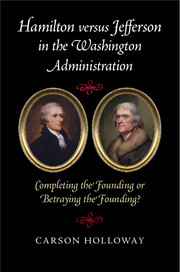 Hamilton versus Jefferson in the Washington Administration
Hamilton versus Jefferson in the Washington Administration Book contents
- Frontmatter
- Dedication
- Contents
- Acknowledgments
- 1 Introduction
- PART I A DEBATE BETWEEN CABINET COLLEAGUES
- 2 Establishing the Public Faith: Hamilton's Report on Public Credit
- 3 First Signs of Division: Assumption and the Back Pay Bill
- 4 Establishing Energetic Government: Hamilton's Report on a National Bank
- 5 Defending Limited Government: Jefferson's Critique of the Constitutionality of the National Bank
- 6 Defending Energetic Government: Hamilton on the Constitutionality of the National Bank
- PART II A CLASH OF RIVAL PARTY LEADERS
- PART III Founding Foreign Policy
- Index
3 - First Signs of Division: Assumption and the Back Pay Bill
from PART I - A DEBATE BETWEEN CABINET COLLEAGUES
Published online by Cambridge University Press: 05 November 2015
- Frontmatter
- Dedication
- Contents
- Acknowledgments
- 1 Introduction
- PART I A DEBATE BETWEEN CABINET COLLEAGUES
- 2 Establishing the Public Faith: Hamilton's Report on Public Credit
- 3 First Signs of Division: Assumption and the Back Pay Bill
- 4 Establishing Energetic Government: Hamilton's Report on a National Bank
- 5 Defending Limited Government: Jefferson's Critique of the Constitutionality of the National Bank
- 6 Defending Energetic Government: Hamilton on the Constitutionality of the National Bank
- PART II A CLASH OF RIVAL PARTY LEADERS
- PART III Founding Foreign Policy
- Index
Summary
In the fall of 1789, George Washington asked Thomas Jefferson to join his cabinet as secretary of state. Jefferson's first inclination was to resist such an appointment. He wrote back to Washington that he preferred to remain in his present position, minister to France. He anticipated that the post into which Washington was trying to shift him would embrace “the principal mass of domestic administration, together with the foreign,” which gave him a certain foreboding about the immensity of the task. He also feared that such an appointment “may end disagreeably for one, who, having no motive to public service but the public satisfaction, would certainly retire the moment that satisfaction should appear to languish.” Despite these reservations, however, Jefferson did not rule out accepting the post, if the president really thought the appointment would be for the public good.
Washington continued to press his suit but in a restrained manner that mirrored Jefferson's initial response: just as Jefferson would not flat out refuse, though he preferred not to accept, so Washington would not insist, though he really did want Jefferson for the job. The president reassured Jefferson on the amount of work the office would entail and emphasized that the appointment had in fact already given satisfaction to the public. He appealed to Jefferson's love of his fellow countrymen. “I consider the successful administration of the general government,” he wrote, “as an object of almost infinite consequence to the present and future happiness of the citizens of the United States.” Washington added that he did not think that anybody else could fill the position of secretary of state better than Jefferson. Sufficiently reassured, it would seem, Jefferson accepted the appointment and began making his preparations to join Washington in Philadelphia.
This decision led to momentous conflicts within Washington's administration. The constitutional and political clashes that ensued could not have riven the cabinet, or at least could not have been so intense, without the addition of Jefferson's presence to Hamilton's at the highest levels of the executive branch – although these conflicts probably would have arisen, even without Jefferson in the cabinet, between the administration and its critics in Congress and in the country. The arguments made in Washington's exchange with Jefferson, moreover, already point to the possibility of such conflict between Washington's chief ministers.
- Type
- Chapter
- Information
- Hamilton versus Jefferson in the Washington AdministrationCompleting the Founding or Betraying the Founding?, pp. 38 - 56Publisher: Cambridge University PressPrint publication year: 2015


